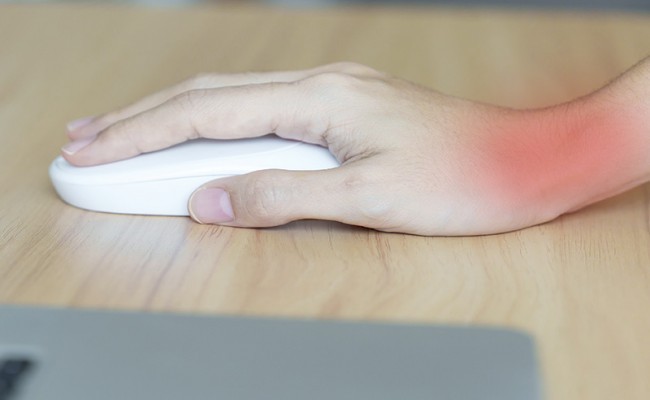
De Quervain's tenosynovitis
- 07/02/2023
What is De Quervain's tenosynovitis?
De Quervain's tenosynovitis is an inflammatory condition that affects the tendons located at the base of the thumb in the wrist, specifically in the first extensor groove. The affected tendons are those that connect the thumb muscles to the carpal bone (wrist). Inflammation of these tendons can cause pain, swelling, and difficulty moving the thumb and wrist.
What causes De Quervain's tenosynovitis?
De Quervain's tenosynovitis is caused by inflammation of two tendons in the wrist that move in a common tendon sheath. The main causes are overload and overuse secondary to:
Repetitive movements:
The main cause is frequent and repetitive movements involving the thumb and wrist, especially those involving abduction (separation) and extension of the thumb, or grasping and pinching movements. This includes activities such as:
- Work tasks: Typing, keyboarding, working with hand tools (hammer, screwdriver), carpentry, gardening, etc.
- Sports: Golf, tennis, rowing, fishing, bowling, etc.
- Daily activities: Lifting or holding a baby (especially the way the baby's head is held, where the thumb is abducted), carrying heavy bags, knitting, painting, playing musical instruments, cooking.
- Excessive use of mobile devices: Texting or playing games on a phone.
Anatomical and physiological factors:
- Hormonal changes: It is more common in women, especially during pregnancy and postpartum. It is believed that hormonal changes and fluid retention can increase swelling in the tendon sheaths.
- Age: It is usually more common in middle-aged people (between 30 and 50 years old).
- Female gender: Women have a higher prevalence than men.
- Anatomical abnormalities: In some cases, the presence of aberrant tendons or a narrow compartment can predispose to irritation.
Trauma and injuries:
- A direct injury to the wrist or thumb can trigger inflammation.
- Inflammatory diseases: Conditions such as rheumatoid arthritis or psoriatic arthritis can cause inflammation in the joints and tissues, including the tendon sheaths, increasing the risk of De Quervain's tenosynovitis.
Other conditions:
- Diabetes: May be a risk factor in some cases.
- Obesity: Being overweight can increase the overall load on the joints and tendons.
How is De Quervain's tenosynovitis diagnosed?
The diagnosis of De Quervain's tenosynovitis is made through a combination of a physical examination, clinical history, and imaging tests. The physical examination includes evaluation of swelling and pain at the base of the thumb, as well as limitation of movement in the wrist and thumb. The doctor may also perform a Finkelstein test, which involves bending the wrist inward and downward while holding the thumb, to determine if there is pain or weakness.
How is De Quervain's tenosynovitis treated?
Treatment for De Quervain's tenosynovitis focuses on reducing inflammation and pain in the wrist and thumb, and improving hand function.
Initial treatment may include:
- Hand rest: avoiding activities that cause pain.
- Ice: applying ice to the affected wrist for 20 minutes every 2-3 hours to reduce inflammation.
- Pain relievers: such as acetaminophen or ibuprofen to relieve pain.
- Physical therapy: specific exercises to strengthen and stretch the tendons and muscles of the wrist and thumb.
In severe cases or those that do not respond to conservative treatment, other options may be considered, such as:
- Ultrasound-guided steroid injections: to reduce inflammation and pain, and improve mobility.
- Surgery: In cases that do not respond to various conservative treatments, surgery can be performed to release the affected tendons.
It is also important to mention that preventative treatment is an important part of avoiding recurrence of the condition, especially by avoiding activities that cause pain and strengthening and stretching the muscles and tendons of the wrist and thumb.
CONSERVATIVE TREATMENT OF DE QUERVAIN'S TENOSYNOVITIS
1. Rest and Activity Modification
- Avoid repetitive movements of the thumb and wrist (pinching, radial or ulnar deviation, lifting weights).
- Reduce or adjust work, sports, or household activities that cause pain.
2. Physiotherapy
- Local cryotherapy.
- Therapeutic ultrasound or low-intensity laser.
- Tendon mobilizations.
- Stretching and progressive strengthening exercises for the thumb and wrist once acute pain subsides.
3. Pharmacological Treatment
- NSAIDs (non-steroidal anti-inflammatory drugs), oral or topical, such as ibuprofen, naproxen, or diclofenac, for 5–10 days according to tolerance.
- Used to control pain and inflammation in the early phase of the condition.
- Can be combined with physiotherapy to optimize results.
4. Ultrasound-Guided Corticosteroid Injection
- Combination of corticosteroid with local anesthetic. (See VIDEO of ultrasound-guided injection for De Quervain's tenosynovitis).
The use of real-time ultrasound during injection is considered the current standard for precision and safety:
Advantages:
- Allows visualization of the involved tendons (abductor pollicis longus and extensor pollicis brevis).
- Identifies anatomical variants (septae within the first dorsal compartment), which are common and clinically relevant.
- Ensures precise placement of the medication within the tendon sheath, improving therapeutic efficacy.
- Multiple studies demonstrate a clinical success rate of 90–95% when injection is performed under ultrasound guidance.
Book an appointment with Dr. Jordi Jiménez. He will see you at the center of Palma de Mallorca and help you regain your quality of life.

![[VIDEO] Ultrasound-Guided Injection for Trigger Finger](https://drjordijimenez.com/imagen/100/100/Imagenes/infiltracion-ecoguidada-dedo-resorte-drjordijimenez.jpg)
![[VIDEO] Ultrasound-guided infiltration of the lumbar facets](https://drjordijimenez.com/imagen/100/100/imagenes-pagina/sindrome-facetario-lumbar-drjordijimenez (1).jpg)
![[VIDEO] Ultrasound-guided infiltration of the hip joint](https://drjordijimenez.com/imagen/100/100/Imagenes/valgo-dinamico-rodilla-drjordijimenez.jpg)